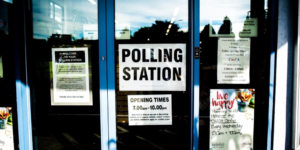In Texas, Your Next Vote Could Be in a May Election
You may have noticed that there was an election held recently, and hopefully you voted. I personally know a few people who only vote at “the big election,” meaning the presidential election that comes around every four years, but I know even more people who endeavor to vote at every election they can, even the relatively “small” ones.
In Texas, voters can usually vote twice a year because there are two annual uniform election dates on which general or special elections may be held: the first Saturday in May and the first Tuesday after the first Monday in November. The uniform election date in November is intended to coincide with national elections, such as the one held earlier this month.
Additionally, in some cases an election may be held on a date other than a uniform election date, and in those cases a voter may be able to vote more than twice in a year, but those cases are exceedingly rare. Also, it is possible for a uniform election date to pass without an election being held in a certain area. This is most likely to occur areas where all political subdivisions hold their regular elections on the uniform election date in November, leaving only special elections, if any, to be held on the uniform election date in May.
General elections are elections held regularly by a political subdivision to elect its officers. Special elections, on the other hand, are ad hoc elections and are therefore not held regularly, and sometimes may only be held once. A political subdivision can hold general and special elections simultaneously on the same election date, such as to elect its officers (general election) and to authorize a bond (special election), and elections from multiple jurisdictions may be combined on a single ballot.
In fact, at some elections, people in certain areas may be able to vote simultaneously in a municipal, county, state, and national election, all with the single push of a “cast ballot” button. Therefore, if all local, state, and national elections are crowded onto the same November ballot, then there may be nothing left to vote on in May.
Sometimes, however, special elections are purposefully called on the May uniform election date to separate relatively small and mundane issues from the politics usually associated with the bigger issues.
Municipalities Can Focus on Local Issues with Special Elections
So, what sort of issues may be voted on at these relatively small special elections? Mind you, these elections may be small in scale, but they are not necessarily small in import. In fact, a given local election may impact some people more directly and more meaningfully than even a presidential election.
For example, an election to impose a sales tax may impact some people on a daily basis. Do you live in a Municipal Utility District? Well, the establishment of that district was voted on at an election held for that purpose, and sometimes that election has only a single voter who resides within the proposed district for the sole purpose of voting at that election. Talk about a “small” election!
Additionally, elections are required to authorize the sale of mixed alcoholic beverages and intoxicating liquors, to authorize the issuance of bonds, to create economic development corporations and to authorize certain projects of those corporations, to annex certain territory into certain municipalities, to extend the terms of municipal officers, to incorporate a municipality or change its form of government, and to create, consolidate, or abolish a school district.
This is by no means an exhaustive list, but it exemplifies the significant impact that some special elections may have, even if the election is held rather quietly on the first Saturday in May of an odd numbered year or if there is nothing else on the ballot.
Perhaps you voted for the first time at this past election, or perhaps you have yet to vote at any election. In any case, I hope that the significant issues that may appear on virtually any ballot encourages you to vote every chance you get—if you do not already do so. The next uniform election day in Texas is Saturday, May 6, 2017. See you at the polls!
